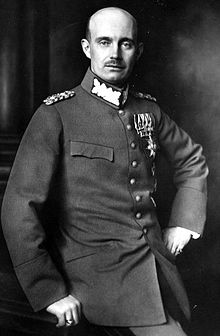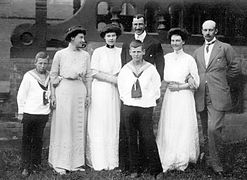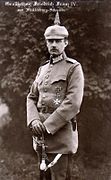Friedrich Franz IV. (Mecklenburg)
Friedrich Franz IV., Grand Duke of Mecklenburg [-Schwerin] (born April 9, 1882 in Palermo ; † November 17, 1945 in Flensburg ; full name: Friedrich Franz Michael ) was the last Grand Duke of the Mecklenburg-Schwerin region and the last ruling monarch in Mecklenburg . He ruled from the death of his father in 1897 (until 1901 under the tutelage of his uncle Duke Johann Albrecht ) until November 14, 1918.
Life
childhood and education
Friedrich Franz was born on April 9, 1882 in Palermo and baptized on May 26, 1882. His parents Friedrich Franz III lived in the Villa Belmonte there . (1851-1897) and Anastasia (1860-1922) most of the year, since Friedrich Franz III. liked to stay in southern countries for health reasons.
Like his father, Friedrich Franz moved to the Vitzthumsche Gymnasium in Dresden. In the autumn of 1900 Friedrich Franz began studying law at the University of Bonn . Here, too, he followed his father's example. Adolf Langfeld was appointed student advisor . In 1899 Friedrich Franz became a corps bow bearer of Borussia Bonn .
government
After taking office, Friedrich Franz worked with his state ministers to reform the Mecklenburg constitution . All bills, which in addition to the representation of the estates also provided for an elected chamber for the state parliament, failed because of the resistance of the states and Mecklenburg-Strelitz .
During the First World War , despite his rank as general of the cavalry, he did not lead any active troop command. As sovereign he visited Mecklenburg troops on the western front . Despite the steadily deteriorating general supply situation since 1915, he did not restrict his relatively lavish lifestyle during the war. Politically, he expressed doubts about the German victory peace which Reich policy and the Supreme Army Command were striving for . In 1917 Friedrich Franz was against the radicalization of warfare. In his opinion, a mutual agreement between all opponents of the war should end the war.
After the suicide of his relative and last regent of the Strelitz line of the Mecklenburg Princely House, Grand Duke Adolf Friedrich VI. von Mecklenburg [-Strelitz], he administered this part of the country as a steward until the November Revolution .
In the autumn of 1918 he was not clear about the seriousness of the situation in the Central Powers . Therefore he was against the armistice request of the Supreme Army Command. His goal was still a mutual agreement. In autumn 1918, he and his Minister of State, Adolf Langfeld, wanted to change the Mecklenburg constitution by proclaiming it personally . He had no political instinct for the approaching November Revolution and was surprised by its outbreak on November 8, 1918.
After the people's government was appointed from members of the Reichstag parties, he resigned the throne for himself and his house on November 14 - as one of the last German monarchs, four days after the emperor's abdication - and emigrated to Denmark. This was the end of the monarchy in Mecklenburg.
Life after the abdication of the throne
With the November Revolution of 1918, the Mecklenburg ruling family was expropriated. As part of the compensation for the prince , Friedrich Franz received the Gelbensande hunting lodge back in 1919 and lived there until 1921. After that, until 1945 he lived mostly in Ludwigslust Palace , which, like the ducal Alexandrinen Cottage in Heiligendamm , remained in the possession of the ducal family was.
His younger son Christian Ludwig Herzog zu Mecklenburg (1912–1996) remembered: “My father was slim and 1.84 m tall. He was bald and had a mustache cut short. His eyes were light blue. He spoke with a wide voice, was a very lively person and was able to converse with several people at the same time. He loved going to the theater, where he loved to listen to operas. ” His sporting hobbies were driving, horse riding, tennis, sailing and, above all, hunting. In 1933 he became a member of the Corps Visigothia Rostock.
In 1945 the family fled to Flensburg from the advancing Red Army, except for the Hereditary Prince Christian Ludwig . Most recently, the family stayed at Glücksburg Castle . Here Friedrich Franz fell ill and died, also due to poor medical care and nutrition. The planned departure to Denmark to his older sister, Queen Alexandrine , no longer succeeded.
family
ancestors
| Pedigree of Grand Duke Friedrich Franz IV of Mecklenburg-Schwerin | ||||||||
|---|---|---|---|---|---|---|---|---|
| Great-great-grandparents |
Friedrich Ludwig zu Mecklenburg-Schwerin (1778–1819) |
King |
Count |
Count |
Tsar |
King |
Grand Duke |
King |
| Great grandparents |
Grand Duke |
Prince |
Tsar Nicholas I of Russia (1796–1855) |
Grand Duke Leopold of Baden (1790–1852) |
||||
| Grandparents |
Grand Duke Friedrich Franz II of Mecklenburg-Schwerin (1823–1883) |
Grand Prince Michael Nikolajewitsch Romanow (1832–1909) |
||||||
| parents |
Grand Duke Friedrich Franz III. von Mecklenburg-Schwerin (1851–1897) |
|||||||
|
Grand Duke Friedrich Franz IV of Mecklenburg-Schwerin (1882–1945) |
||||||||
Marriage and descendants
Grand Duke Friedrich Franz IV married on June 7, 1904 in Gmunden Princess Alexandra of Hanover and Cumberland , daughter of Crown Prince Ernst August of Hanover (1845–1923) and Princess Thyra of Denmark (1853–1933), the youngest daughter of King Christian IX. from Denmark . The couple had five children:
- Friedrich Franz (1910-2001)
- ⚭ 1941 Karin von Schaper (1920–2012)
- Christian Ludwig (1912–1996)
- ⚭ 1954 Barbara Princess of Prussia (1920–1994)
- Olga (1916-1917)
- Thyra (1919-1981)
- Anastasia (1922-1979)
- ⚭ 1941 Friedrich Ferdinand of Schleswig-Holstein-Sonderburg-Glücksburg (1913–1989)
On the occasion of the wedding in 1904, the Mecklenburg government had new two- and five-mark pieces struck and put into circulation. On the front, next to their heads, is the inscription Friedrich Franz - Alexandra Grand Duke and Grand Duchess of Mecklenburg-Schwerin 7. VI. The reverse shows the well-known imperial eagle.
In 1943 Friedrich Franz appointed his son Christian Ludwig as his successor as chairman of the Mecklenburg-Schwerin family association. After the death of Friedrich Franz IV, the eldest son Friedrich Franz took over as head of the House of Mecklenburg-Schwerin.
military
Regiment chief
- Chief of the 1st and 3rd Battalions of the Grand Ducal Mecklenburg Grenadier Regiment No. 89
- Chief of the 1st Grand Ducal Mecklenburg Dragoon Regiment No. 17
- Chief of the "Infantry Regiment Grand Duke Friedrich Franz II. Of Mecklenburg-Schwerin (4th Brandenburg) No. 24"
- Chief of the "Imperial Russian Moscow Grenadier Regiment No. 8"
À la suite
- of the Guard Cuirassier Regiment
- of the 1st Sea Battalion
gallery
literature
- Friedrich Karl Devens : Biographical corps album of Borussia in Bonn 1827-1902. Düsseldorf 1902, p. 245.
- Jürgen Borchert : Mecklenburg's Grand Dukes 1815-1918. Demmler Verlag, Schwerin 1992, ISBN 978-3-910150-14-0 , pp. 98-108.
- Christian Ludwig von Mecklenburg : Stories from my life. Stock & Stein, Schwerin 1998, ISBN 978-3-910179-75-2 .
- Cecilie von Prussia: memories. Koehler & Amelang, Munich / Berlin 2001, ISBN 978-3-7338-0304-9 .
- Bernd Kasten : The last Grand Duke. Friedrich Franz IV of Mecklenburg-Schwerin (1882–1945). In: Mecklenburgische Jahrbücher. Volume 122 (2007). Pp. 253-285.
- Bernd Kasten: Nobody can say where that will go ...: Grand Duke Friedrich Franz IV. During the First World War. In: Mecklenburg-Magazin (2008), No. 11, p. 21.
- Stephan Sehlke: Pedagogue-Pastor-Patriots. Books on Demand, Norderstedt 2009, ISBN 978-3-8370-9497-8 , p. 115.
- Bernd Kasten: Prince Schnaps. Black sheep in the Princely House of Mecklenburg. Hinstorff Verlag, Rostock 2009, ISBN 978-3-356-01334-4 , pp. 102-103.
- Bernd Kasten: Friedrich Franz IV. The end of the house of Mecklenburg. In: Bernd Kasten, Matthias Manke , René Wiese: The Grand Dukes of Mecklenburg-Schwerin. Hinstorff Verlag GmbH, Rostock 2015, ISBN 978-3-356-01986-5 , pp. 126-144.
- Antje Strahl: The Grand Duchy of Mecklenburg-Schwerin in the First World War: From a peace economy to a war economy. Böhlau Verlag GmbH & Cie, Cologne-Weimar-Vienna 2015, ISBN 978-3-412-22496-7 .
Web links
- Literature about Grand Duke Friedrich Franz IV. In the state bibliography MV
- Revolution in Mecklenburg: The last Grand Duke abdicates. Heike Mayer, NDR 1 Radio MV
Individual evidence
- ^ Jürgen Borchert: Mecklenburgs grand dukes. 1815-1918. Demmler Verlag, Schwerin 1992, p. 99.
- ^ Jürgen Borchert: Mecklenburgs grand dukes. 1815-1918. Demmler Verlag, Schwerin 1992, p. 101.
- ↑ Kösener Corpslisten, 1910, 19/723.
- ↑ Christian Ludwig von Mecklenburg: Stories from my life. Stock & Stein, Schwerin 1998, p. 18.
- ↑ Christian Ludwig von Mecklenburg: Stories from my life. Stock & Stein, Schwerin 1998, p. 19 f.
- ↑ Kösener Corp lists 1960, 120/194.
- ↑ The couple divorced on September 22, 1967, but remarried on April 27, 1977 at Glücksburg Castle.
- ↑ Mecklenburg wedding money. In: Father-city sheets . Year 1904, No. 41, edition of October 9, 1904, p. 167.
- ^ Genealogical handbook of the nobility (1959). Volume V. Starke Publishing House . Page 46–49
- ↑ Burke's Royal Families of the World. Vol 1 Europe and Latin America. (1977). Burke's Peerage P 236
| predecessor | Office | successor |
|---|---|---|
| Friedrich Franz III. |
Grand Duke of Mecklenburg [-Schwerin] 1897–1918 |
--- |
| personal data | |
|---|---|
| SURNAME | Friedrich Franz IV. |
| ALTERNATIVE NAMES | Mecklenburg, Friedrich Franz IV. Von (wrong name form) |
| BRIEF DESCRIPTION | Grand Duke of Mecklenburg in Mecklenburg-Schwerin (1897–1918) |
| DATE OF BIRTH | April 9, 1882 |
| PLACE OF BIRTH | Palermo |
| DATE OF DEATH | November 17, 1945 |
| Place of death | Flensburg |












